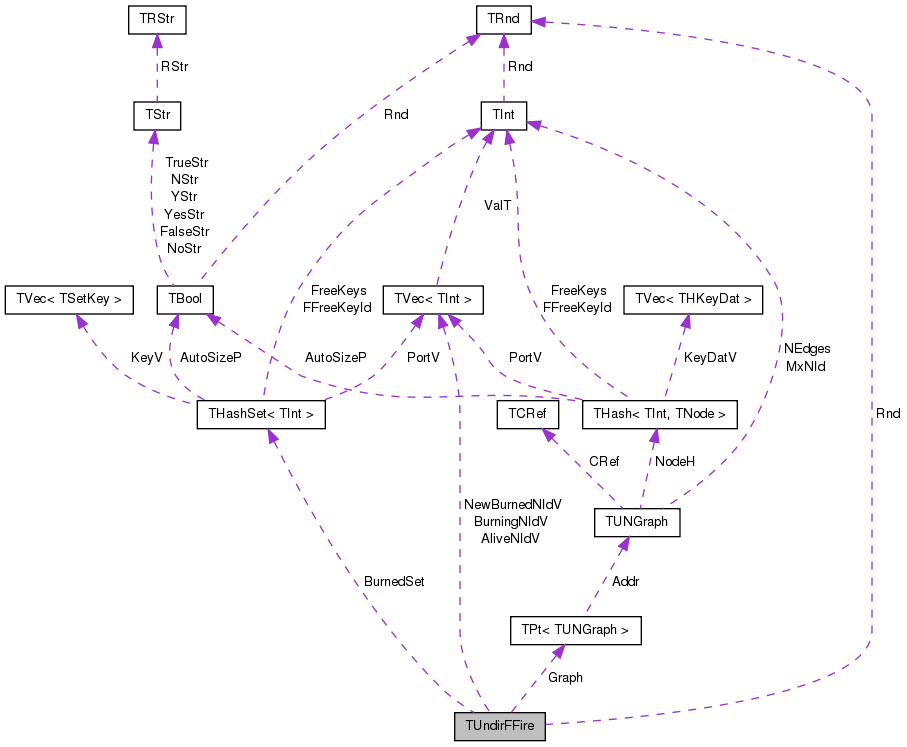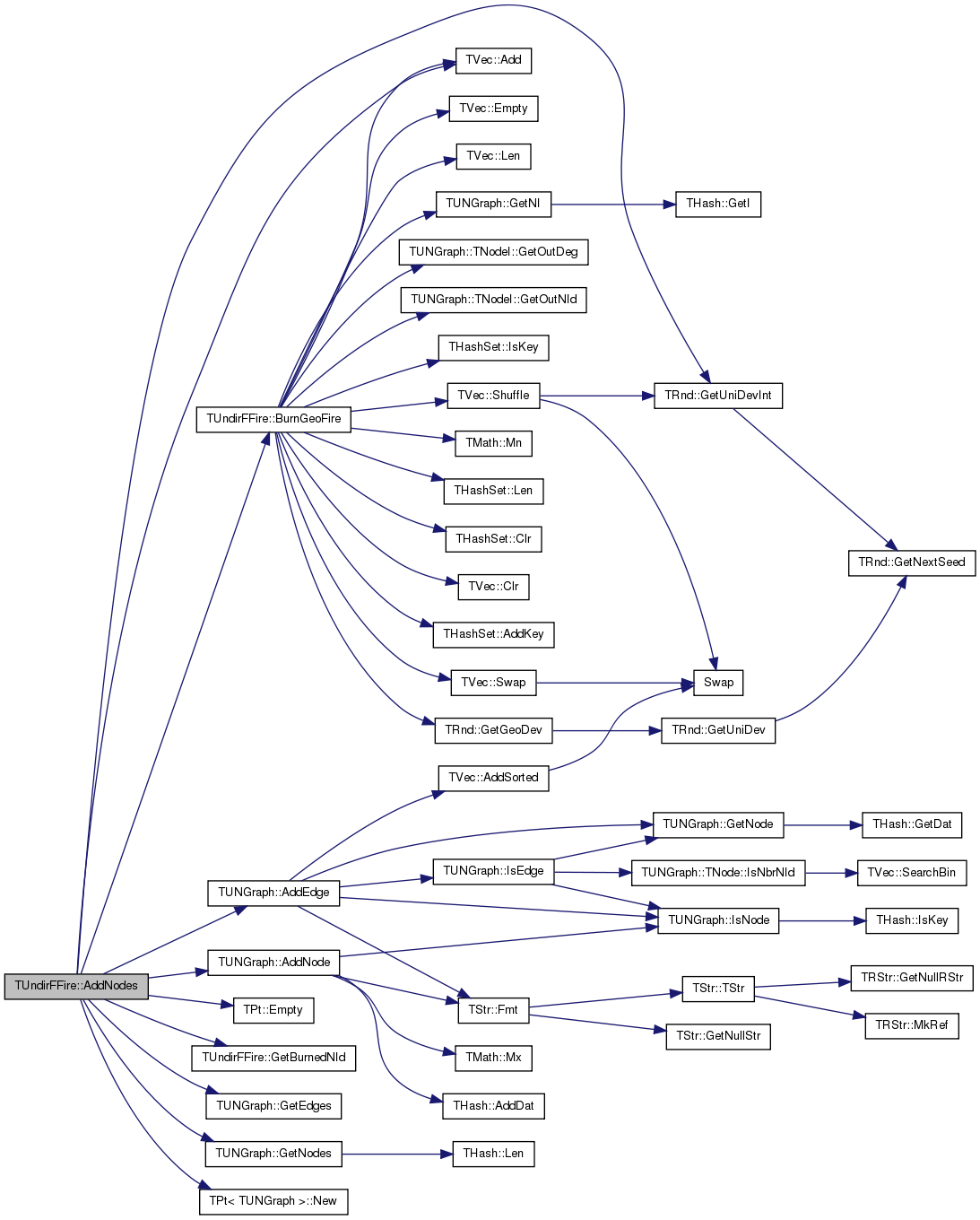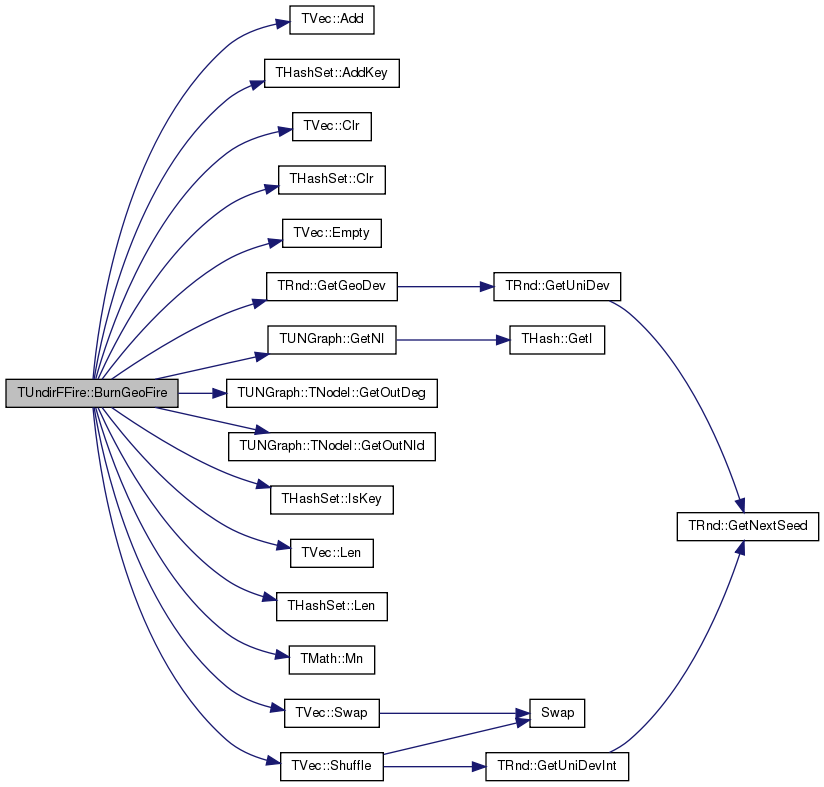|
SNAP Library , Developer Reference
2013-01-07 14:03:36
SNAP, a general purpose, high performance system for analysis and manipulation of large networks
|
|
SNAP Library , Developer Reference
2013-01-07 14:03:36
SNAP, a general purpose, high performance system for analysis and manipulation of large networks
|
#include <ff.h>

Public Member Functions | |
| TUndirFFire (const double &_BurnProb=0.3) | |
| void | SetGraph (const PUNGraph &GraphPt) |
| PUNGraph | GetGraph () const |
| int | GetNBurned () const |
| int | GetBurnedNId (const int &n) const |
| int | BurnGeoFire (const int &StartNId) |
| TFfGGen::TStopReason | AddNodes (const int &GraphNodes, const bool &FloodStop=true) |
Private Attributes | |
| TRnd | Rnd |
| PUNGraph | Graph |
| double | BurnProb |
| TIntSet | BurnedSet |
| TIntV | BurningNIdV |
| TIntV | NewBurnedNIdV |
| TIntV | AliveNIdV |
Simulates a single Forest Fire on a undirected graph starting for a given starting node (does not densify!).
| TUndirFFire::TUndirFFire | ( | const double & | _BurnProb = 0.3 | ) | [inline] |
Definition at line 140 of file ff.h.
: Graph(TUNGraph::New()), BurnProb(_BurnProb) { }
| TFfGGen::TStopReason TUndirFFire::AddNodes | ( | const int & | GraphNodes, |
| const bool & | FloodStop = true |
||
| ) |
Definition at line 784 of file ff.cpp.
References TVec< TVal >::Add(), TUNGraph::AddEdge(), TUNGraph::AddNode(), BurnGeoFire(), BurnProb, TPt< TRec >::Empty(), GetBurnedNId(), TUNGraph::GetEdges(), TUNGraph::GetNodes(), TRnd::GetUniDevInt(), Graph, IAssert, Kilo, TPt< TUNGraph >::New(), Rnd, TFfGGen::srFlood, and TFfGGen::srOk.
{
printf("\n***Undirected GEO ForestFire: graph(%d,%d) add %d nodes, burn prob %.3f\n",
Graph->GetNodes(), Graph->GetEdges(), GraphNodes, BurnProb);
TExeTm ExeTm;
int Burned1=0, Burned2=0, Burned3=0; // last 3 fire sizes
TIntPrV NodesEdgesV;
// create initial set of nodes
if (Graph.Empty()) { Graph = PUNGraph::New(); }
if (Graph->GetNodes() == 0) { Graph->AddNode(); }
int NEdges = Graph->GetEdges();
// forest fire
for (int NNodes = Graph->GetNodes()+1; NNodes <= GraphNodes; NNodes++) {
const int NewNId = Graph->AddNode(-1);
IAssert(NewNId == Graph->GetNodes()-1); // node ids have to be 0...N
const int StartNId = Rnd.GetUniDevInt(NewNId);
const int NBurned = BurnGeoFire(StartNId);
// add edges to burned nodes
for (int e = 0; e < NBurned; e++) {
Graph->AddEdge(NewNId, GetBurnedNId(e)); }
NEdges += NBurned;
Burned1=Burned2; Burned2=Burned3; Burned3=NBurned;
if (NNodes % Kilo(1) == 0) {
printf("(%d, %d) burned: [%d,%d,%d] [%s]\n", NNodes, NEdges, Burned1, Burned2, Burned3, ExeTm.GetStr());
NodesEdgesV.Add(TIntPr(NNodes, NEdges));
}
if (FloodStop && NEdges>1000 && NEdges/double(NNodes)>100.0) { // average node degree is more than 50
printf("!!! FLOOD. G(%6d, %6d)\n", NNodes, NEdges); return TFfGGen::srFlood; }
}
printf("\n");
IAssert(Graph->GetEdges() == NEdges);
return TFfGGen::srOk;
}

| int TUndirFFire::BurnGeoFire | ( | const int & | StartNId | ) |
Definition at line 745 of file ff.cpp.
References TVec< TVal >::Add(), THashSet< TKey, THashFunc >::AddKey(), AliveNIdV, BurnedSet, BurningNIdV, BurnProb, TVec< TVal >::Clr(), THashSet< TKey, THashFunc >::Clr(), TVec< TVal >::Empty(), TRnd::GetGeoDev(), TUNGraph::GetNI(), TUNGraph::TNodeI::GetOutDeg(), TUNGraph::TNodeI::GetOutNId(), Graph, IAssert, THashSet< TKey, THashFunc >::IsKey(), TVec< TVal >::Len(), THashSet< TKey, THashFunc >::Len(), TMath::Mn(), NewBurnedNIdV, Rnd, TVec< TVal >::Shuffle(), and TVec< TVal >::Swap().
Referenced by AddNodes().
{
BurnedSet.Clr(false);
BurningNIdV.Clr(false);
NewBurnedNIdV.Clr(false);
AliveNIdV.Clr(false);
const TUNGraph& G = *Graph;
int NBurned = 1;
BurnedSet.AddKey(StartNId);
BurningNIdV.Add(StartNId);
while (! BurningNIdV.Empty()) {
for (int node = 0; node < BurningNIdV.Len(); node++) {
const int& BurningNId = BurningNIdV[node];
const TUNGraph::TNodeI& Node = G.GetNI(BurningNId);
// find unburned links
AliveNIdV.Clr(false); // unburned links
for (int e = 0; e < Node.GetOutDeg(); e++) {
const int OutNId = Node.GetOutNId(e);
if (! BurnedSet.IsKey(OutNId)) {
AliveNIdV.Add(OutNId); }
}
// number of links to burn (geometric coin). Can also burn 0 links
const int BurnNLinks = Rnd.GetGeoDev(1.0-BurnProb) - 1;
if (! AliveNIdV.Empty() && BurnNLinks > 0) {
AliveNIdV.Shuffle(Rnd);
for (int i = 0; i < TMath::Mn(BurnNLinks, AliveNIdV.Len()); i++) {
BurnedSet.AddKey(AliveNIdV[i]);
NewBurnedNIdV.Add(AliveNIdV[i]);
NBurned++;
}
}
}
BurningNIdV.Swap(NewBurnedNIdV); // each node is burning just 1 time step
// BurningNIdV.AddV(NewBurnedNIdV); // all nodes are burning eternally
NewBurnedNIdV.Clr(false);
}
IAssert(BurnedSet.Len() == NBurned);
return NBurned;
}


| int TUndirFFire::GetBurnedNId | ( | const int & | n | ) | const [inline] |
Definition at line 144 of file ff.h.
References BurnedSet.
Referenced by AddNodes().
{ return BurnedSet[n]; }

| PUNGraph TUndirFFire::GetGraph | ( | ) | const [inline] |
| int TUndirFFire::GetNBurned | ( | ) | const [inline] |
| void TUndirFFire::SetGraph | ( | const PUNGraph & | GraphPt | ) | [inline] |
TIntV TUndirFFire::AliveNIdV [private] |
Definition at line 138 of file ff.h.
Referenced by BurnGeoFire().
TIntSet TUndirFFire::BurnedSet [private] |
Definition at line 137 of file ff.h.
Referenced by BurnGeoFire(), GetBurnedNId(), and GetNBurned().
TIntV TUndirFFire::BurningNIdV [private] |
Definition at line 138 of file ff.h.
Referenced by BurnGeoFire().
double TUndirFFire::BurnProb [private] |
Definition at line 136 of file ff.h.
Referenced by AddNodes(), and BurnGeoFire().
PUNGraph TUndirFFire::Graph [private] |
Definition at line 135 of file ff.h.
Referenced by AddNodes(), BurnGeoFire(), GetGraph(), and SetGraph().
TIntV TUndirFFire::NewBurnedNIdV [private] |
Definition at line 138 of file ff.h.
Referenced by BurnGeoFire().
TRnd TUndirFFire::Rnd [private] |
Definition at line 134 of file ff.h.
Referenced by AddNodes(), and BurnGeoFire().